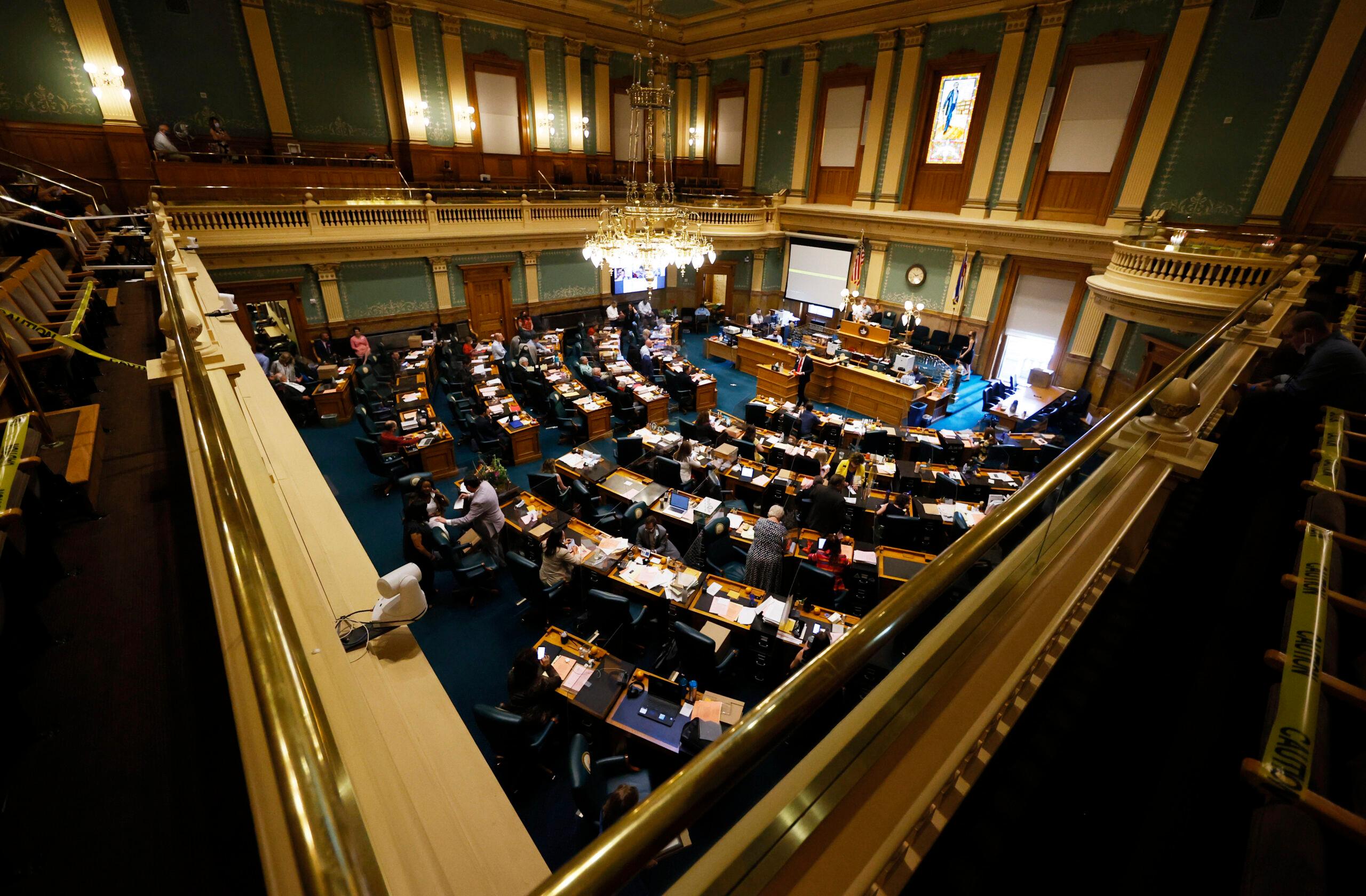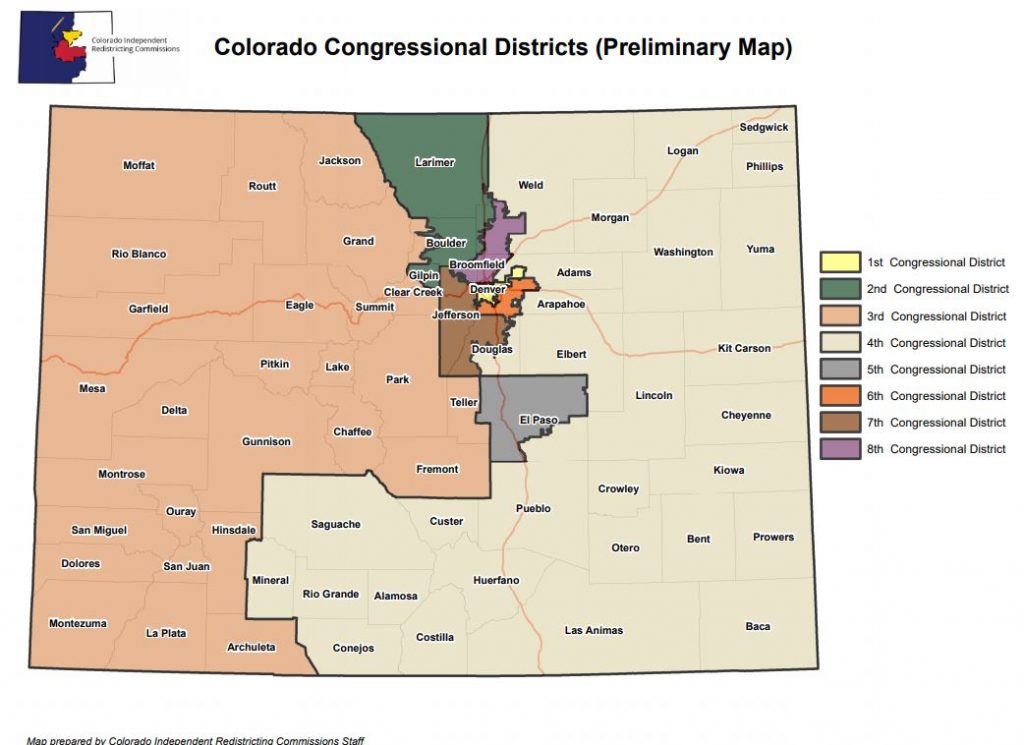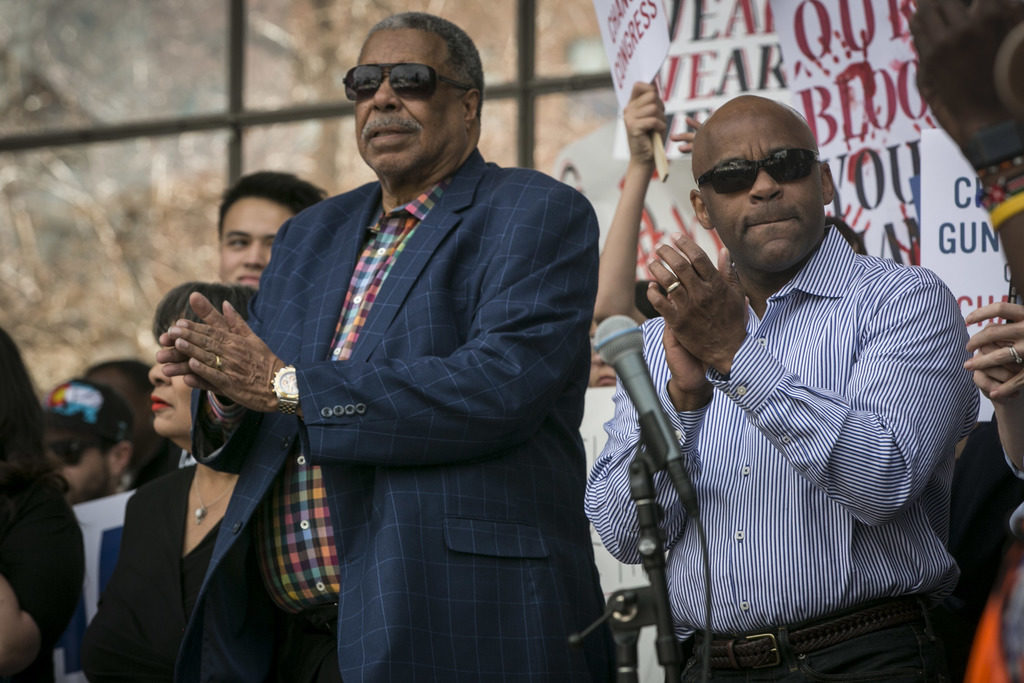
Colorado’s new redistricting process was intended to replace politicians with independent commissioners, and party interests with public input. But recent developments show there are still plenty of ways for partisans to try to influence the process.
On Tuesday, Democratic attorney Mark Grueskin filed a complaint against three prominent Colorado Republicans — former state sen. Greg Brophy, former state House Speaker Frank McNulty, and Alan Philp with the Colorado Neighborhood Coalition — alleging that they have been trying to influence the state’s redistricting process without properly disclosing their efforts.
The complaint filed on behalf of a voter in Larimer county, alleges the men either failed to properly register as lobbyists while conducting meetings related to redistricting and proposing ideas for maps, or they didn’t disclose income.
“Philp, McNulty, and Brophy met with one or more redistricting commissioners to address redistricting maps, mapping approaches and mapping criteria,” according to the complaint.
“Philp, McNulty, and Brophy, therefore acted and qualified as redistricting lobbyists.”
The complaint now sits with the Secretary of State’s Office.
McNulty, who is the registered agent for the Colorado Neighborhood Coalition, said Philp is the group’s lobbyist. Philp appears in the lobbyist database on the Secretary of State’s website and is reportedly being paid $2,000 a month for his work. McNulty and Brophy are not listed.
“It’s a grassroots organization that works to get people involved in the process,” said McNulty. “And the group has hired a lobbyist to communicate with commissioners, fully compliant with Colorado law. So the only other thing that I can take from this is that the Democrats are afraid and they want to suppress the public's ability to turn out at these hearings and share their opinion.”
McNulty and Grueskin were on the same side when Colorado was considering setting up independent redistricting commissions — they were part of a bipartisan coalition that worked to build public support for the new process. McNulty said so far he’s pleased with how the commissions’ public hearings have allowed people to come in with their own ideas.
The new process gives additional power to unaffiliated commissioners
By setting up the new independent commissions and barring state lawmakers from any decision-making power, Colorado voters have tried to remove as much of the politics from redistricting as possible.
The commissioners are constitutionally required to get feedback from residents, something they’ve been doing for weeks, as they’ve taken the staff’s drafts to public hearings happening across the state.
“It was always the point to show a map and have people provide that input,” said Independent Redistricting Commission staff director Jessika Shipley.

She and other non-partisan staff will submit revised proposals in early September using the final census data and incorporating ideas from the public and commissioners.
“When we start drawing these staff maps, the whole point is to gather what we learned and talk about it as a group and follow the criteria in the constitution, using the real data that we got… and create maps that hopefully speak to what people have been asking of us,” said Shipley.
Nine other states are using some type of bipartisan commission for redistricting, with the overall goal of operating with more fairness and transparency. It’s an approach that has proven popular with voters across the political spectrum.
“I think they would like people to have to make compromises and have to move away from the polarities and move closer to the people who are in the center,” said attorney Mario Nicolais.
Nicolais served as a Republican member of the commission charged with drawing Colorado’s statehouse maps last time around (voters changed the makeup and functioning of that commission in 2018). He is now unaffiliated. He said he’s glad the new independent commissions require a supermajority vote to approve a map, and that at least two unaffiliated members need to sign off on it, an arrangement that gives unaffiliated commissioners considerable power.
Public input from particular perspectives
The new process depends in part on the premise that a knowledgeable public will inform the commissions about the maps they think are best, but this summer’s public meetings have shown it’s still mostly a limited group of people participating, and they generally do have political skin in the game.
Organizations from the right and left have urged their followers to weigh in on which communities should be grouped together. While their arguments often have to do with shared local concerns or compatible sensibilities, moving a town or a neighborhood from one district or another can greatly influence how competitive a seat is, and shape how various parts of the state will be represented in Congress. Added to the complexity of the process is the new 8th congressional district Colorado has gained because of its population growth over the last decade.
Nicolais believes it’s unrealistic to expect average Coloradans to be heavily involved with redistricting because it’s such a technical process.
“Redistricting is very, very inside baseball for a lot of people. And it's got a lot more complexity and nuance than most of the public is willing to engage in and think about. I don't know that it's all that different than it was in years past. That's just my own personal take.”
And Shipley said commissioners are open to hearing the views of political insiders.
“Because they're not just saying, ‘people with a political bent can't be involved in this process at all.’ Because everybody's the public,” said Shipley. But “I think they don't like it at all when people aren't being honest or open or clear about who they are.”
One way politicians are trying to influence the process came to light recently with a leaked video of Republican state Republican Rep. Matt Soper talking with a handful of Republican voters earlier this year.
In the video meeting Soper went so far as to suggest arguments they might use in an upcoming public hearing to help Republican interests and potentially keep his seat safe, without explicitly saying that. The Colorado Springs Gazette first reported on his remarks.
“It’s not like I was convincing people to do something they weren’t already interested in and willing to do,” said Soper, noting that he was talking to an audience of conservative Republicans.
“They wanted to participate in redistricting. They wanted to hear what makes a community of interest.”
People who aren’t paid to represent interests before the commission don’t have to register as lobbyists, even if they come with specific political goals in mind.
‘Discrimination against experience’
Denise Torrez is a public school teacher and a Democrat from Pueblo. She’s been trying to engage average citizens in redistricting, but said it’s been tough.
“In many ways, with people in survival mode... is this really a top priority for a lot of people?” she said. “We need to make it so that it is and make it understandable so that everyday people can see how important it is. This is for all of us.”
Shipley said the commission will end up holding more than 30 hearings, and while those will impact the eventual outcome, she said the commission keeps the hearings in perspective.
“Even at our busiest meeting, where we had 60 people testify over the course of three or four hours, that's still just 60 people from a particular community. And does it represent those people? Does having a county commissioner coming out really represent everybody in that community? And obviously we know that it doesn't,” she said.
This year’s redistricting process is giving some Colorado Democrats pause; if voters hadn’t approved independent commissions, their party — which controls the legislature — would be in charge right now.

Prominent Democratic powerbroker and former Denver Mayor Wellington Webb dismisses the idea that putting regular citizens without ties to politics in charge of this process is the right way to go. Instead, he sees the commission effort as “discrimination against experience.”
“I think there were some outsiders that came in and tried to throw out phrases like, ‘let's get the politicians out of it. Maps in the past were gerrymandered.’ And that was just a bunch of bull” said Webb, who had been involved with previous redistricting endeavors.
People familiar with the effort to get Amendments Y and Z on the ballot said Republicans were more motivated to push for the change, although Democrats did publicly support it too, and the state legislature unanimously referred the question to the ballot. Webb said Republicans were smart to get behind independent commissions.
“The one thing that I give Republicans credit for is, when they have power, they use it. And when they lose power, they try to figure out a way to get it back,” said Webb. “And Democrats normally tend to go along with it... at their own demise.”
But Democratic Sen. Jeff Bridges said even though Democrats control Colorado’s government, independent commissions are the right way to go; after all, his party may not still be in power in the next redistricting cycle. And he still thinks commissions create the best maps.
“There is no such thing as a permanent majority. And so setting up the structures and mechanisms of governing in such a way that they are fair and representative, and that they are constructed to make sure that the will of the people of Colorado is represented in their legislature and in their congressional delegation, is always the right thing to do.”
Editor's Note: The original version of this story incorrectly stated which county the voter who filed the lobbying complaint lives in. It has been corrected.
- Colorado’s Getting Another Seat In Congress. Here’s How The Congressional Map Will Be Redrawn
- Between Redistricting, Changing Demographics And New Political Trends, Doug Lamborn’s Long Tenure In Congress Faces New Challenges
- Four Big Questions (And Answers) About How Redistricting Could Affect Republican Representatives In Southern Colorado









